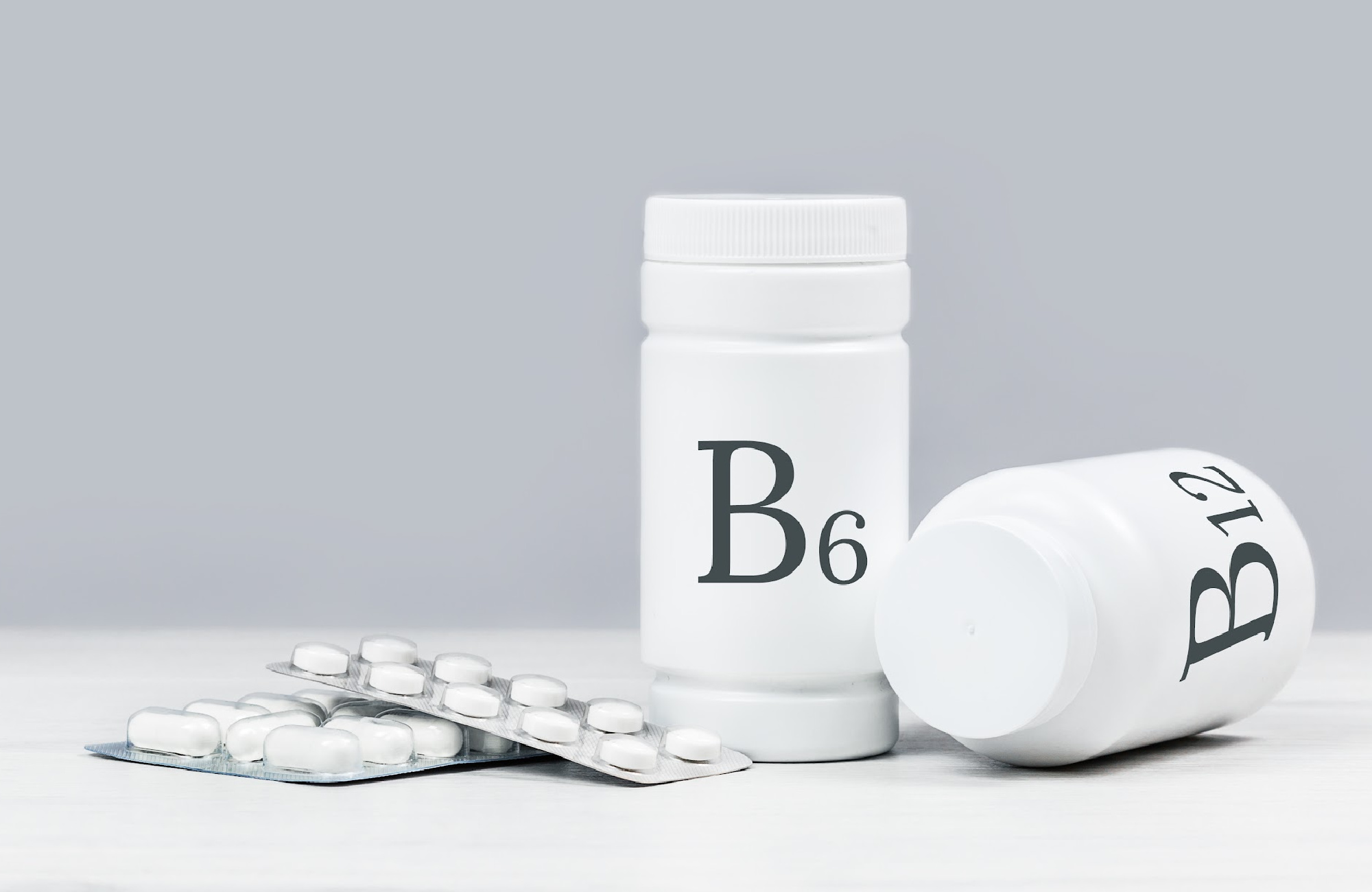Over half of US adults use supplements. Vitamin supplements often contain high doses of vitamins that greatly exceed the RDA (recommended dietary allowance). While in some situations including vitamin deficiency or for certain medical conditions, supplementing with certain vitamins is indicated, it is important to work with a qualified healthcare professional to determine the best dose, to appropriately monitor levels, and to select a brand that has the dose it advertises. Moreover, just like vitamin deficiencies can be harmful to health, so can vitamin excess. It is therefore important to work with a clinician who can counsel you with respect to possible side effects of excessive supplementation.
Vitamin B6 and Vitamin B12 are commonly used by individuals and recommended in the integrative and functional medicine community. Vitamin B complex (containing B6 and B12, among other B vitamins) has been shown to significantly reduce depressive and anxiety symptoms, compared to placebo. Higher dietary intake of vitamins B1 (thiamine) and B2 (riboflavin) has been correlated with a lower risk of PMS symptoms while a high dose of supplemental B6 (50mg/day) has been shown to alleviate premenstrual emotional symptoms. Additionally, adequate B vitamin levels are required for generating energy in our mitochondria and they have antioxidant properties.
While B6 and B12 may be used as part of vitamin B complex to alleviate mood symptoms and anxiety, and B complex is often used to support women with PMS symptoms, or autoimmune conditions, and B6 is often used for nausea and vomiting in pregnancy, it is critical that individuals taking these supplements for these or other reasons be assessed for possible side effects of too much vitamin B and have their levels monitored.
What does vitamin B6 do?
Vitamin B6 is involved in approximately 150 different biological reactions in our body. It is involved in protein, carbohydrate, and lipid metabolism. It plays a role in producing neurotransmitters in our body, and therefore plays a role in our cognitive function. Vitamin B6 also plays a role in our immune system and blood sugar regulation. It acts as an antioxidant, fighting the formation of reactive oxygen species, which can be toxic to cells.
What does vitamin B12 do?
Vitamin B12 is critical for the development and function of our nervous system, red blood cell production, and our DNA synthesis.
What is the RDA for vitamins B6 and B12?
The Recommended Dietary Allowance for vitamin B6 is 1.3 mg/day for women and men ages 19 to 50 years. This target increases for individuals over 51 and women who are pregnant or lactating, but never passes 2 mg/day.
The Recommended Dietary Allowance for vitamin B12 is 2.4 mcg/day for women and men 14 and older.
What can happen if I am deficient in vitamin B6?
Vitamin B6 deficiency is uncommon, but when it occurs in adults, it can be associated with anemia, depression, confusion, weakened immune function, swollen tongue, or cracks at the corners of the mouth.
What can happen if I am deficient in vitamin B12?
Vitamin B12 deficiency is not uncommon and in adults can cause fatigue, anemia, low counts of white and red blood cells and platelets, tongue inflammation, dementia, numbness and tingling, and infertility.
What side effects can occur from over-supplementation with vitamins B6 and B12?
Symptoms of vitamin B6 toxicity are similar to symptoms of its deficiency. Nerve damage, called peripheral sensory neuropathy, may occur and present itself as numbness of hands and feet. Some individuals can experience balance problems. Bone pain, muscle weakness, muscle twitching, skin lesions, and gastrointestinal symptoms such as nausea and heartburn can also occur. Neurologic impairment can resolve within 6 months of discontinuing vitamin B6, however, some people do not recover.
A study of over 75,000 postmenopausal women revealed that a combined high intake of vitamin B6 and B12 supplements was associated with an increased risk of hip fracture.
How can I naturally boost my levels of B6 and B12?
It is important to note that as long as one is able to absorb properly through the gastrointestinal tract, the best way to get your vitamins and minerals is through food!
Vitamin B6-rich foods include milk, ricotta cheese, salmon, tuna, eggs, chicken liver, beef, spinach, sweet potato, green peas, bananas, chickpeas, and avocado.
Vitamin B12-rich foods include clams, beef liver fortified breakfast cereals, salmon, trout, milk, yogurt, ham, eggs, and chicken breast.
More sources of Vitamin B6 and sources of Vitamin B12 can be found on the NIH.gov website.
It is critical to be guided by a qualified healthcare provider with respect to supplements use, indications, and monitoring. At Dr. Bojana Jankovic Weatherly’s practice, our approach includes a comprehensive assessment including a thorough history, physical exam, and personalized laboratory workup. To help you reach your health goals safely and effectively, your health recommendations are personalized to you, using evidence-based medicine and applying it to your unique needs.
References:
https://www.ncbi.nlm.nih.gov/pmc/articles/PMC3658370/pdf/ISRN.PSYCHIATRY2013-621453.pdf
https://ods.od.nih.gov/factsheets/VitaminB6-HealthProfessional/
https://ods.od.nih.gov/factsheets/VitaminB12-HealthProfessional/
https://pubmed.ncbi.nlm.nih.gov/21346091/
https://www.ncbi.nlm.nih.gov/books/NBK554500/
https://jamanetwork.com/journals/jamanetworkopen/fullarticle/2733176

